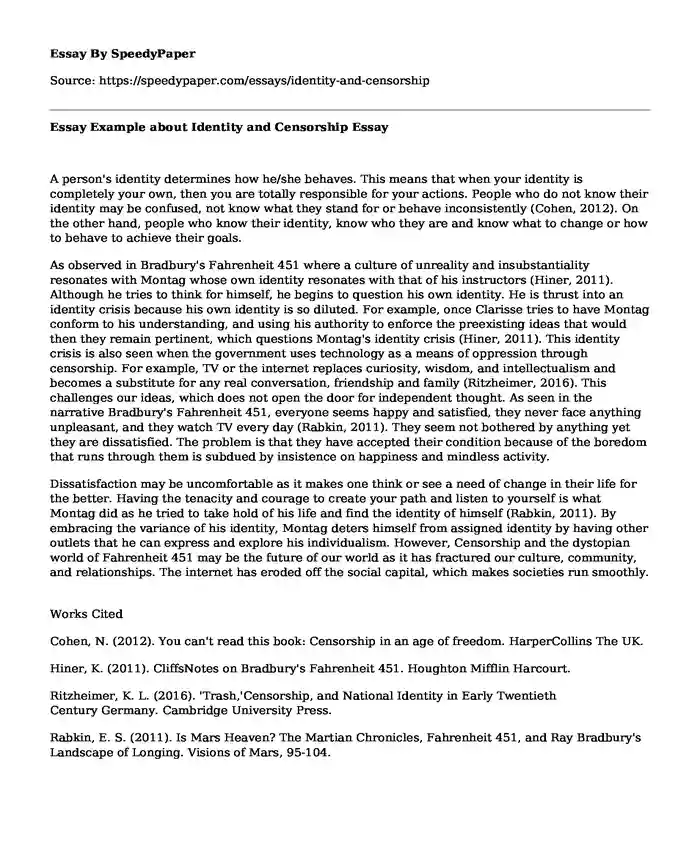
| Type of paper: | Article |
| Categories: | Censorship Ray Bradbury |
| Pages: | 2 |
| Wordcount: | 452 words |
A person's identity determines how he/she behaves. This means that when your identity is completely your own, then you are totally responsible for your actions. People who do not know their identity may be confused, not know what they stand for or behave inconsistently (Cohen, 2012). On the other hand, people who know their identity, know who they are and know what to change or how to behave to achieve their goals.
As observed in Bradbury's Fahrenheit 451 where a culture of unreality and insubstantiality resonates with Montag whose own identity resonates with that of his instructors (Hiner, 2011). Although he tries to think for himself, he begins to question his own identity. He is thrust into an identity crisis because his own identity is so diluted. For example, once Clarisse tries to have Montag conform to his understanding, and using his authority to enforce the preexisting ideas that would then they remain pertinent, which questions Montag's identity crisis (Hiner, 2011). This identity crisis is also seen when the government uses technology as a means of oppression through censorship. For example, TV or the internet replaces curiosity, wisdom, and intellectualism and becomes a substitute for any real conversation, friendship and family (Ritzheimer, 2016). This challenges our ideas, which does not open the door for independent thought. As seen in the narrative Bradbury's Fahrenheit 451, everyone seems happy and satisfied, they never face anything unpleasant, and they watch TV every day (Rabkin, 2011). They seem not bothered by anything yet they are dissatisfied. The problem is that they have accepted their condition because of the boredom that runs through them is subdued by insistence on happiness and mindless activity.
Dissatisfaction may be uncomfortable as it makes one think or see a need of change in their life for the better. Having the tenacity and courage to create your path and listen to yourself is what Montag did as he tried to take hold of his life and find the identity of himself (Rabkin, 2011). By embracing the variance of his identity, Montag deters himself from assigned identity by having other outlets that he can express and explore his individualism. However, Censorship and the dystopian world of Fahrenheit 451 may be the future of our world as it has fractured our culture, community, and relationships. The internet has eroded off the social capital, which makes societies run smoothly.
Works Cited
Cohen, N. (2012). You can't read this book: Censorship in an age of freedom. HarperCollins The UK.
Hiner, K. (2011). CliffsNotes on Bradbury's Fahrenheit 451. Houghton Mifflin Harcourt.
Ritzheimer, K. L. (2016). 'Trash,'Censorship, and National Identity in Early Twentieth Century Germany. Cambridge University Press.
Rabkin, E. S. (2011). Is Mars Heaven? The Martian Chronicles, Fahrenheit 451, and Ray Bradbury's Landscape of Longing. Visions of Mars, 95-104.
Cite this page
Essay Example about Identity and Censorship. (2022, Feb 22). Retrieved from https://speedypaper.net/essays/identity-and-censorship
Request Removal
If you are the original author of this essay and no longer wish to have it published on the SpeedyPaper website, please click below to request its removal:
- What Is the Definition of Love - Essay Example
- Free Essay on Leadership Issues in the Movies
- Cognitive, Physical and Psychosocial Development. Free Essay.
- Smartphones and Our Abilities to Solve Problems - Essay Example
- Essay Sample: Why Gay Marriage Is a Good Thing
- Free Essay Analyzing Washington's Farewell Address
- Essay Sample on Types of Regimes
Popular categories




